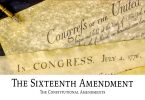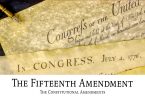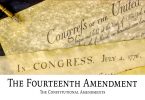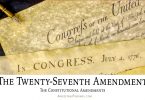There was a pretty big time gap between the adoption of the twelfth and thirteenth amendments to the US Constitution. In fact, the gap was more than sixty years, longer than any other gap between amendments in US history so far. The thirteenth amendment is the first of three so-called “Civil War” amendments that were adopted to the Constitution as a direct result of the outcome of the US Civil War. This is what you need to know about the thirteenth amendment.
What Does it Say?
Section 1. Neither slavery nor involuntary servitude, except as a punishment for crime whereof the party shall have been duly convicted, shall exist within the United States, or any place subject to their jurisdiction.
Section 2. Congress shall have power to enforce this article by appropriate legislation.
What Does it Mean?
Proposed by Congress in January of 1865 and adopted to the Constitution in December of that same year via a ¾ majority of twenty-seven of the then thirty-six states at the time, the thirteenth amendment abolishes and prohibits slavery and involuntary servitude in the United States, except as a punishment for a crime. While President Abraham Lincoln’s Emancipation Proclamation of January 1863 technically did free all of the slaves in the United States, even in Confederate-controlled ones, this proclamation was not enforced in every state until the passage of the thirteenth amendment. The Confederate states ignored it until the end of the war, when they were forced to re-join the Union, except for Confederate states that were controlled by Union forces when the Emancipation Proclamation was announced. By the time the thirteenth amendment was adopted, all state legislatures had freed their enslaved people by legislative decree (or by force from Union troops), except for Delaware and Kentucky. The thirteenth amendment ended slavery in those last two holdout states.
The thirteenth amendment is one of the few amendments that is almost never mentioned in case law. It has only been used to strike down isolated “incidents of slavery,” race-based discrimination, and cases where a technically free laborer is forced to work under slave-like conditions. These incidents were mostly cited shortly after the end of the Civil War. In modern times, the thirteenth amendment has sometimes been used to create laws against sex trafficking and other forms of modern slavery.
Even though Lincoln’s Emancipation Proclamation granted slaves their freedom, their legal status was uncertain right after the Civil War. This is because the Proclamation was essentially an executive order that could be overturned by a subsequent President. To give the former slaves the legal security they needed to ensure they retained their freedom, a Constitutional amendment was needed. The original Constitution indirectly made slavery legal with its 3/5ths Compromise that allowed state legislatures to count each slave in their state as 3/5 of a person for Congressional representation purposes. The thirteenth amendment ensured that former slaves would remain legally free. All northern states and border states that were not part of the Confederacy voted to ratify the amendment immediately. With some gently nudging, President Andrew Johnson (who became president after Lincoln’s assassination), the former Confederate states of North Carolina, Georgia, and Alabama also voted to ratify it, giving Congress the ¾ majority of states it needed to adopt the amendment to the US Constitution.




